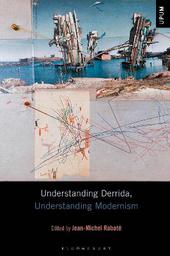
|
Understanding Derrida, Understanding Modernism
Hardback
Main Details
Description
This volume makes a significant contribution to both the study of Derrida and of modernist studies. The contributors argue, first, that deconstruction is not "modern"; neither is it "postmodern" nor simply "modernist." They also posit that deconstruction is intimately connected with literature, not because deconstruction would be a literary way of doing philosophy, but because literature stands out as a "modern" notion. The contributors investigate the nature and depth of Derrida's affinities with writers such as Joyce, Kafka, Antonin Artaud, Georges Bataille, Paul Celan, Maurice Blanchot, Theodor Adorno, Samuel Beckett, and Walter Benjamin, among others. With its strong connection between philosophy and literary modernism, this highly original volume advances modernist literary study and the relationship of literature and philosophy.
Author Biography
Jean-Michel Rabate is one of the world's foremost literary theorists. Since 1992, he has been professor of English and Comparative Literature at the University of Pennsylvania, USA. Professor Rabate has authored or edited more forty books on modernism, psychoanalysis, contemporary art, philosophy, and writers like Beckett, Pound and Joyce. Recent books include Crimes of the Future (Bloomsbury, 2014), The Cambridge Introduction to Psychoanalysis and Literature (2014), The Pathos of Distance (Bloomsbury, 2016), and Rust (Bloomsbury, 2018). He is one of the founders and curators of Slought Foundation in Philadelphia (slought.org) and the Managing Editor of the Journal of Modern Literature. Since 2008, he has been a Fellow of the American Academy of Arts and Sciences.
ReviewsUnderstanding Derrida, Understanding Modernism is a superb, transformative exercise of critical thought, attuned to both contextual and philosophical-ethical differance; it allows Derrida's work to be read next to, and by, a multi-angled and often eccentric philosophical and literary modernism. In a scholarship of industrial proportions, it stands out as writing after one of the most revolutionary thinkers of all time. * Textual Practice * The 14 diverse and original essays in this volume-along with Rabate's important introduction and brilliant glossary of Derrida keywords-make it an immensely useful resource for understanding Derrida's relation to major European modernists...More important, however, are the local insights these essays provide on topics such as Baudelaire's ethics of almsgiving, the difference between Agamben and Derrida on reading Kafka, the relation of Bataille's "general economy" to Derrida's "arche-writing," the agon between Derrida and Sartre vis-a-vis Genet... Summing Up: Highly recommended. * CHOICE * Derrida as a reader of modernism; Derrida as a modernist: both these propositions-and the relationship between them-are explored in this fascinating collection of essays, ably introduced and edited by Rabate. The volume makes a fresh contribution to our understanding of the reach and richness of Derrida's work as well as the multifaceted character of modernist literature and philosophy. * Derek Attridge, Emeritus Professor of English, University of York, UK, and author of The Singularity of Literature (2004) * Who, or better yet, what speaks in 'literature' for Derrida? This long-awaited book offers thought-provoking answers to this question, examined here through close readings of Derrida's countersignatures to writers such as Baudelaire, Kafka, Celan, Joyce, Blanchot, Beckett, and Cixous. Neither a theory nor a critical method, Derrida's approach gives us something else to ponder: the conditions of the impossible enacted by the event of literature. This impressive volume thus allows us to better understand how Derrida reconfigures the concept of modernity, beyond all labels, genres, or periodizations. Moreover, this book is itself a remarkable and timely contribution to the 'humanities to come' Derrida so pressingly called for. Whether it concern the Law, the absolute singularity of the other, the secret and testimony, or democracy, literature always lies affirmatively and performatively at the very core of Derrida's thought. * Ginette Michaud, Professor of French Literature, Universite de Montreal, Canada *
|